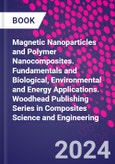Magnetic Nanoparticles and Polymer Nanocomposites: Fundamentals and Biological, Environmental and Energy Applications focuses on the manufacturing and design of innovative magnetic polymeric nanocomposite materials for a broad range of different applications. These materials have truly outstanding and sustainable properties unlike other composites because they are combined with both organic (polymer matrix) and inorganic (semiconductor nanoparticles) materials to form a sustainable composite material. The book's focus is on magnetic semiconductor and polymer nanocomposites made from bioresorbable and biocompatible polymers, modified with magnetic nanoparticles.
This book provides detailed knowledge on the modern research application of magnetic semiconductor and polymeric nanocomposites that have tremendous commercial value. In addition, these nanocomposite materials are also a good source for the renewable energy-based industry.
Please Note: This is an On Demand product, delivery may take up to 11 working days after payment has been received.
Table of Contents
1. Advances in magnetic nanoparticle for biomedical applications2. Magnetic polymeric and silver nanocomposites: Properties, synthesis, and antimicrobial evaluation
3. Graphene-based magnetic nanoparticles
4. Biomedical applications of rare earth element (REE) doped magnetic ferrite nanoparticles and nanocomposites
5. Recent advances in magnetic nanoparticleeenabled drug delivery attributes of polymer nanocomposites
6. Polymer-coated magnetic nanoparticles for cancer therapy
7. Magnetic semiconductors and polymer nanocomposites for degradation of organic pollutants and treatment of water
8. Magnetic nanoparticlesepolymer composites for multifeatured drug delivery
9. Multifunctional polymer nanocomposites with magnetic nanoparticles: design, synthesis, and biomedical applications
10. Nanocomposites of magnetic nanoparticles and graphene oxide in water and food sample analysis
11. Magnetic nanocomposites for biomedical and environmental applications
12. Magnetic polyurethane compositesdfabrication and applications
13. Magnetic composites: fundamentals, synthesis, and applications
14. Impact of the rare earth elements doping on the copper ferrite spinel magnetic nanoparticles
15. Novel magnetic nanocomposites and their environmental applications
16. Role of magnetic polymerecoated nanoparticles in separation sciences
17. Adsorption of heavy metal ions based on stimuli-responsive polymerefunctionalized magnetic nanoparticles
18. Magnetic nanoparticles and nanocomposites for the applications of photocatalytic degradation of organic dyes
19. Magnetic-based nanocomposites for hydrogen generation as renewable energy
20. Magnetic Fe3O4 and its composites for electrochemical sensing applications
21. Magnetic nanocomposites for energy storage and wastewater treatment applications
22. Removal of organic pollutants from wastewater using spinel manganese ferrite nanoparticles
23. Metal oxideebased spinel ferrite magnetic nanocomposites for hydrogen production
Authors
Imran Khan Applied Science and Humanities Section, University Polytechnic, Aligarh Muslim University, Aligarh-India. Dr. Imran Khan is currently an Assistant Professor in the Department of Chemistry, at Sultan Qaboos University, Muscat, Oman. Formerly, he was a Postdoctoral Fellow in Process and Product Applied Thermodynamics (PATh), in the associated laboratory CICECO (Center for Research in Ceramics & Composite Materials), Dept. of Chemistry, University of Aveiro, Portugal. His areas of research include solution chemistry, the thermophysical behavior of pure liquids and liquid mixtures with ionic liquids, surfactant and polymers, and extraction and separation using Ionic liquids. Dr. Khan has worked as a visiting scientist for three months in the Department of Chemistry, at the University of Delhi, India where he studied the effect of polymers on Ionic liquid solutions funded by FCT Portugal to expand collaboration between India and Portugal. As a postdoctoral fellow at the Universiti Sains Malaysia, from 2011 to 2013, he worked on the effect of fillers on pressure sensitive adhesives and published many research articles. Anish Khan Assistant Professor in Chemistry Department, Center of Excellence for Advanced Materials Research, King Abdulaziz University, Jeddah 21589, Saudi Arabia.Dr. Anish Khan is currently working as Assistant Professor in Chemistry Department, Centre of Excellence for Advanced Materials Research (CEAMR), Faculty of Science, King Abdulaziz University, Jeddah, Saudi Arabia. Completed Ph.D. from Aligarh Muslim University, India in 2010. Completed Postdoctoral from School of Chemical Sciences, University Sains Malaysia (USM) in Electroanalytical chemistry in 2010. Working in the field of synthetic biosensor, polymer composites, organic-inorganic electrically conducting nanocomposites. More than 200 research articles, 70 book chapters 30 books published in referred international publisher and more than 20 international conferences/ workshop. More than 30 research projects completed. Editorial board member of more than 11 international journals. Member of American Nano Society.
Mohammad Mujahid Ali Khan Assistant Professor, Applied Science and Humanities Section, Faculty of Engineering and Technology, University Polytechnic, Aligarh Muslim University, Aligarh, India. Mohammad Mujahid Ali Khan obtained his PhD from Aligarh Muslim University in 2015. He is actively engaged in researchon the synthesis, characterization, electrochemical study and transport phenomena of composite membranes for
desalination and waste water treatment applications. He has been teaching applied chemistry to students
[Diploma Eng.] in the University Polytechnic, Aligarh Muslim University, India. He has published 29 papers in journals of high
repute such as Desalination, Material Science and Eng C and the Journal of Industrial and Eng Chemistry etc. He has also
participated in 18 National and International conferences and symposium.








